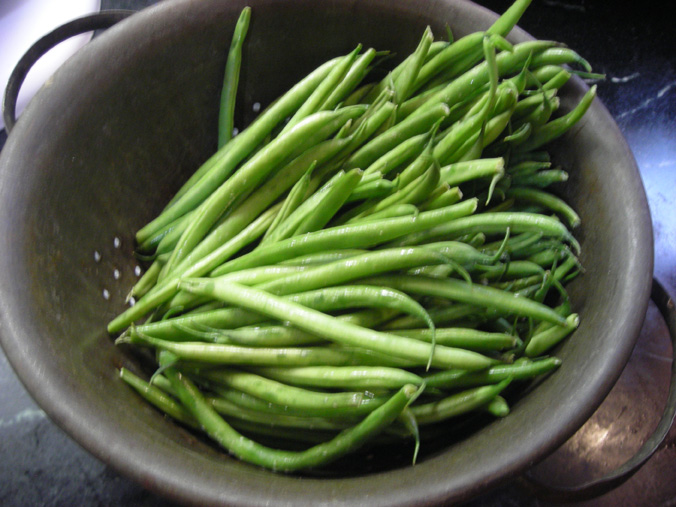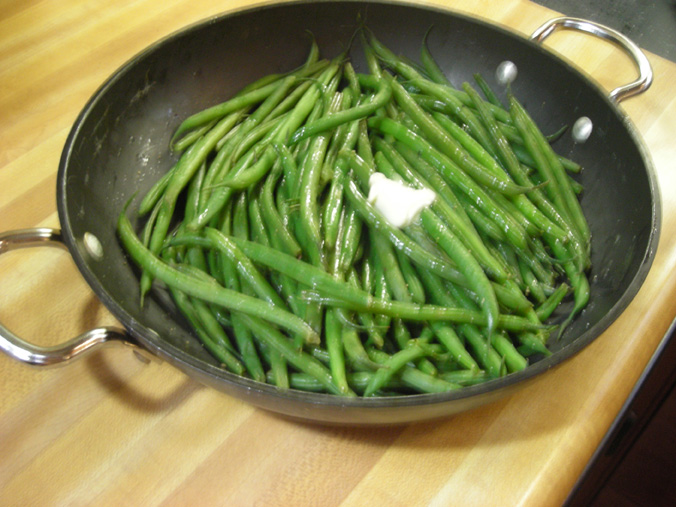
Jefferson-era Recipe: French Beans
Time for the May installment of our monthly series in which we post a recipe from The Virginia House-wife, a recipe book published in 1824 by Mary Randolph, kinswoman to Thomas Jefferson. Leni Sorensen, our African American Research Historian and a culinary historian of national repute, has once again made this month's dish and here we include her notes and pictures.
FRENCH BEANS
May 2011
The original recipe from Mary Randolph:
Cut off the stalk end first, and then turn to the point and strip off the strings ; if not quite fresh, have a bowl of spring water, with a little salt dissolved in it, standing before you, as the beans are cleansed and trimmed, throw them in ; when all are done, put them on the fire in boiling water with some salt in it ; when they have boiled fifteen or twenty minutes, take one out and taste it ; as soon as they are tender, take them up, and throw them into a colander to drain. To send up the beans whole, when they are young, is much the best method, and their delicate flavor and colour is much better preserved. When a little more grown, they must be cut across, in two, after stringing ; and for common tables, they are split, and divided across ; but those who are nice, do not use them at such a growth as to require splitting. (Mary Randolph, The Virginia House-Wife, 1824; facsimile of first edition, Historical notes and commentaries by Karen Hess, University of South Carolina Press, 1984, p. 126)
Note:
In this recipe MR seems to be much more concerned about the age and size of the beans than the final dressing of the finished dish as she makes no mention of butter or any other seasoning. She makes a clear distinction between the young beans that the ‘nice’ housemistress would chose versus more mature beans only appropriate for the ‘common table.” See below for the etymology of the word ‘nice’ as it has evolved from MR’s time to ours.
I am unclear why she specifically calls for spring water to refresh her “not quite fresh beans.” But certainly she expects beans to have strings whatever their maturity. Today with the exception of heirloom or Italian or Romano-type beans most green beans have had the string bred out of them.
Etymology of the word "nice":
Oxford English Dictionary:
NICE
Etymology: < Anglo-Norman nice, nis, nise and Old French nice (c1160; c1250 as niche; now French regional) < classical Latin nescius (see nescious adj.). Compare Old Occitan nesci (c1150; also attested as neci, nesi, nessi; Occitan neci), Spanish necio (1220–50), Catalan neci, nici (both 14th cent.), Portuguese necio (14th cent.; 15th cent. as néscio), Italian nescio (1321), all in sense ‘foolish, simple, ignorant’.The semantic development of this word from ‘foolish, silly’ to ‘pleasing’ is unparalleled in Latin or in the Romance languages. The precise sense development in English is unclear. N.E.D. (1906 ) s.v. notes that ‘in many examples from the 16th and 17th cent. it is difficult to say in what particular sense the writer intended it to be taken’.
3 b. Fastidious, fussy, difficult to please, esp. with regard to food or cleanliness; of refined or dainty tastes.
[...examples:]
1836 C. Shaw Let. 15 June in Personal Mem. & Corr. (1837) II. 593, I can eat anything, and am not very nice about the cleanliness.
1856 N. Hawthorne Eng. Note-bks. (1879) II. 318 Neither is it [sc. ivy] at all nice as to what it clutches, in its necessity for support.
1947 R. Pitter On Cats 15 To eat rats and such he was too nice.
1952 M. Kennedy Troy Chimneys 60 Nobody, seeing her then, could have been so nice as to complain of such blemishes.
========American Heritage Dictionary
http://dictionary.reference.com/browse/nice
nice1. pleasing; agreeable; delightful: a nice visit.
2. amiably pleasant; kind: They are always nice to strangers.
3. characterized by, showing, or requiring great accuracy, precision, skill, tact, care, or delicacy: nice workmanship; a nice shot; a nice handling of a crisis.
4. showing or indicating very small differences; minutely accurate, as instruments: a job that requires nice measurements.
5. minute, fine, or subtle: a nice distinction.
6. having or showing delicate, accurate perception: a nice sense of color.
7. refined in manners, language, etc.: Nice people wouldn't do such things.
8. virtuous; respectable; decorous: a nice girl.
9. suitable or proper: That was not a nice remark.
10. carefully neat in dress, habits, etc.
11. (especially of food) dainty or delicate.
12. having fastidious, finicky, or fussy tastes: They're much too nice in their dining habits to enjoy an outdoor barbecue.
13. Obsolete . coy, shy, or reluctant.
14. Obsolete . unimportant; trivial.
15. Obsolete . wanton.—Usage note
The semantic history of NICE is quite varied, as the etymology and the obsolete senses attest, and any attempt to insist on only one of its present senses as correct will not be in keeping with the facts of actual usage. If any criticism is valid, it might be that the word is used too often and has become a cliché lacking the qualities of precision and intensity that are embodied in many of its synonyms.




